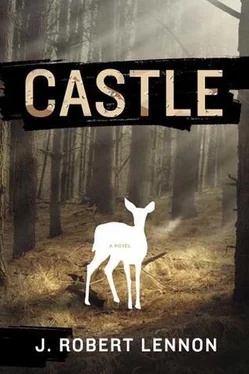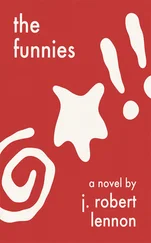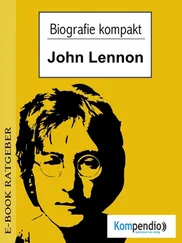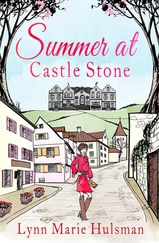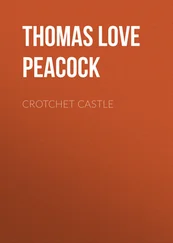He walked around the far end of the table, past Professor Stiles’s abandoned meal, and stood beside her, his hands on his hips. He was shouting at her hung head.
“It’s you, Cybele! It’s you! And what do you have to say to that, hah? What do you have to say!”
My mother was frozen now, silent, her eyes squeezed shut.
“That’s what I thought,” my father spat. “Eric, go outside.”
I didn’t hear at first — or, rather, I heard, but it was unclear that he was talking to me. I remained in my seat through several seconds of silence.
His head snapped up, the face red and folded over itself like a pug’s. “Go outside!” he screamed, and I jumped down from my chair and ran out the door.
It was a lovely evening in early spring, a bit cold to be out without a jacket, but I intended to keep moving, and would likely feel no particular discomfort. The sun had set, but there was still light in the near-cloudless sky, enough to see by until I reached the streetlights. I walked the three blocks down Jefferson, turned onto Main, and strolled into town; the closer I came to the park, the busier were the streets — there was Pernice’s; there was Old Gerry’s Diner. The marquee above the movie theater entrance was illuminated, and high school boys and girls were lined up there for tickets, the boys pushing one another and laughing, the girls huddled into little clusters, whispering to one another. Some kids a little older than I were playing touch football in the park, and I went to a bench and sat down to watch them. On the sidewalk in front of me, a crow was eating a dropped piece of bread.
I woke up shivering to the sound of a man’s voice. “Son,” the man said, but it wasn’t my father. It was a policeman.
“Shouldn’t you be going to bed about now? Where do you live?”
I blinked. There was a bit of drool on my face, which I wiped with my sleeve. “Jefferson Street, sir,” I said.
“Well, what are you doing here?”
“Going for a walk, sir.”
The policeman was short and heavy, and the gray hair underneath his hat was cut close, in the military style. He leveled a skeptical look and said, “You’re not walking, son, you’re sleeping.”
“I just … I fell asleep.”
“Your parents know you’re here?”
“Yes, sir.”
The policeman sighed. “C’mon,” he said. “I’ll give you a lift home.”
“I can walk, sir,” I said, getting to my feet. I began to inch around him. I noticed my shoe was untied, but that would have to wait.
“I don’t think your parents want you walking home in the dark,” he said. He put his hand on my shoulder and led me to the edge of the park, where his patrol car was parked. He ushered me through the passenger side door, got in behind the wheel, and pulled away from the curb.
I bent down and tied my shoe. The police car reached the end of Main. The radio quietly squawked and spat.
“Left or right?”
“Right, sir.” I hesitated before adding, “Please don’t do the lights and siren.”
He hazarded a sideways glance. “I wasn’t going to.”
“Thank you, sir.”
When my house was still a block away, I asked him to stop. He reached across me to open the door of the car, and I stepped out.
“Anything you want to tell me, son?” the policeman asked.
“No, sir.”
“Sure about that?”
“Yes.”
I stood on the sidewalk as he turned around and drove slowly back toward downtown. When the car was out of sight, I hurried the last block to my house, climbed the unlit front steps, and silently opened the front door.
The house was dark, save for the cold glow coming from the kitchen. I could hear water running. The clock on the mantel said it was a quarter to ten, past my bedtime by more than an hour. I was uncertain how aware they would have been of my absence — it was possible that, in the heat of their argument, they would have assumed I had merely gone up to bed and stayed there. But then again, my mother might be worried about me, and would want to know I was home safe.
I decided that, on balance, it was best to sneak up to my room. If my mother thought I was out, she would have had the porch light on, and would have been looking for me through the front window. I crept down the hall and hurried past the archway that led to the dining room.
There, however, I stopped. It was possible to see through the archway, across the dining room, and through a second archway to the kitchen, and I had caught a glimpse of my mother in her familiar position in front of the sink. She didn’t turn — the sound of the running water had obscured my footsteps. But something about the scene didn’t appear right, and I leaned back for another look.
The dining room table still had not been cleared, though the candles were out, and several glasses had been knocked over, staining the tablecloth. In addition, the tablecloth was crooked, hanging almost to the ground at one corner, and some dishes and silverware had fallen, spattering the floor with food and shards of porcelain. This was unusual, of course. But it was
my mother’s appearance that was most strange. I was accustomed to seeing her bent over in a laborer’s stance, her head hung, her shoulders rolling, arms working at the dishes. She had been, of all things, a golf prodigy in high school — in fact, had dropped out in order to join the tournament circuit, in the hope of becoming a professional — but, according to family lore, had chosen my father over the greens, and put away her clubs for good. I had always been impressed by my mother’s athleticism, and her willingness to have abandoned her ambitions for the smaller accomplishments of home. But now I was given to doubt, for the first time, whether this life was what she really had wanted. She stood motionless at the sink, her head high, as though she were staring out the window. The window, however, was curtained. The honey-colored chignon into which she had arranged her hair was half-undone across one shoulder, and she was leaning slightly to one side.
I watched for a good minute, expecting her to break out of her reverie and return to work. But nothing happened. The water was running at full blast, making quite a racket in the otherwise silent house, and I began to grow nervous.
“Mother?” I said.
There was no response. I walked into the dining room and made my slow way around the table, warning her of my presence. “I’m home,” I called out. “I’m sorry I’m so late.”
I peered into the kitchen. Up close, her stillness seemed even stranger. I could see now that her dress hung crookedly across her shoulders, and the heel of one of her shoes was missing. That accounted for the lean.
“Mother?”
I entered the kitchen, treading heavily, so as not to shock her when I tapped her shoulder. Soon I was standing beside her, looking up.
“Mother!” Her right hand was hanging beside her, and I took it in mine. It was cold. She didn’t look at me.
Her left hand was in the sink, under the water. It alarmed me at first to notice that only the hot was turned on — I thought she must be burning. A few plates and forks were stacked under the flow, and her hand lay on top, the water cascading over it. I reached out and moved the faucet over to the opposite sink. It, too, was ice cold. I turned off the water and pulled my mother’s hand out.
She had begun to tremble. I ran my hands up her arms — she was freezing!
“Here, Mother.” I pulled the wooden stool out from under the small table the telephone sat on, and placed it behind her. I told her to sit. She didn’t seem to hear me. I pushed her gently, reached up and pushed her shoulders, and she sank slowly, trembling, until she landed on the stool. “Stay there,” I said. I ran to the living room, turned up the thermostat, and removed the knitted afghan from the sofa. Back in the kitchen, I wrapped it around her shoulders. Then I took the box of matches from the drawer, turned on the oven, and lit the pilot light. I left the door open — she was sitting right beside it. I heard the furnace clank on beneath us and roar to life.
Читать дальше
